人教新目标英语八年级上册Unit 2 How often do you exercise Section B (3a--Self Check)课件(共19张PPT)
文档属性
| 名称 | 人教新目标英语八年级上册Unit 2 How often do you exercise Section B (3a--Self Check)课件(共19张PPT) | 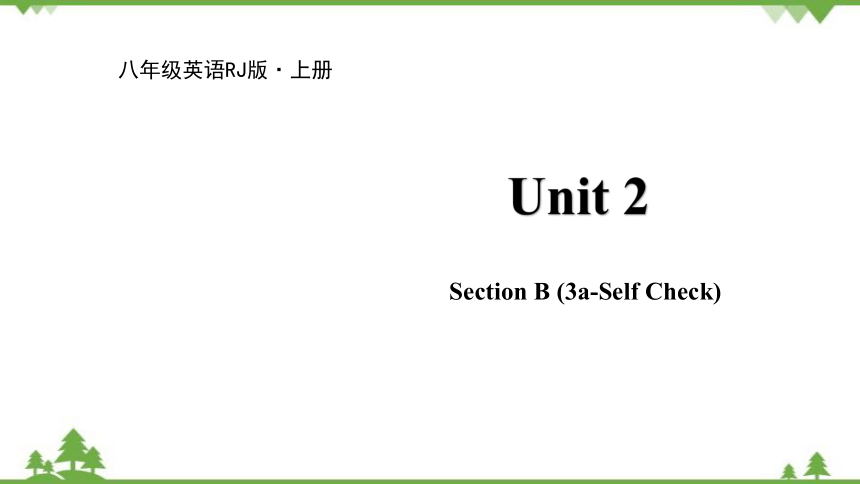 | |
| 格式 | pptx | ||
| 文件大小 | 212.0KB | ||
| 资源类型 | 教案 | ||
| 版本资源 | 人教新目标(Go for it)版 | ||
| 科目 | 英语 | ||
| 更新时间 | 2023-06-25 09:22:08 | ||
图片预览

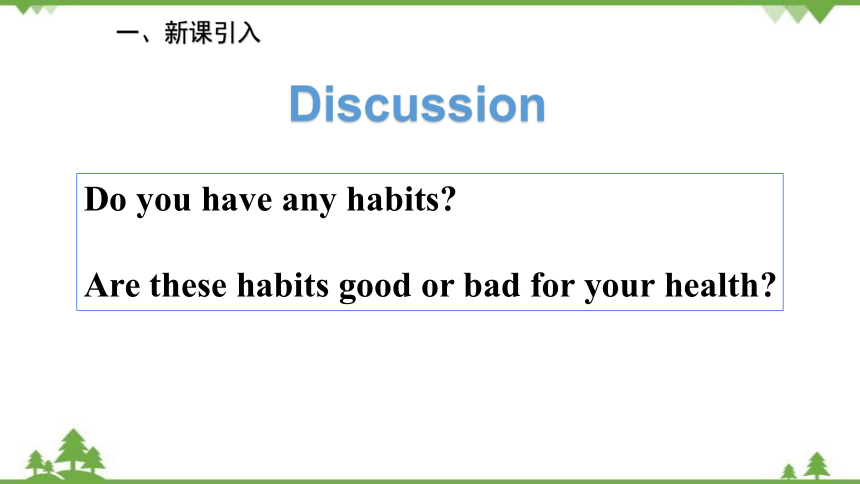
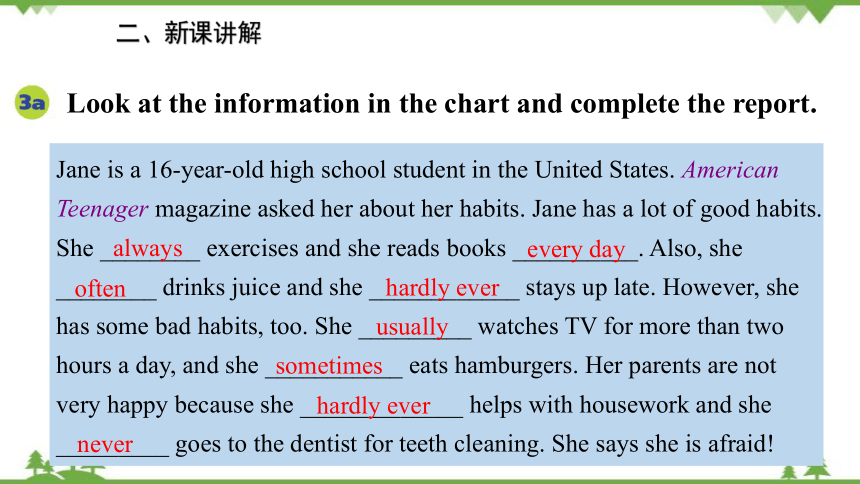
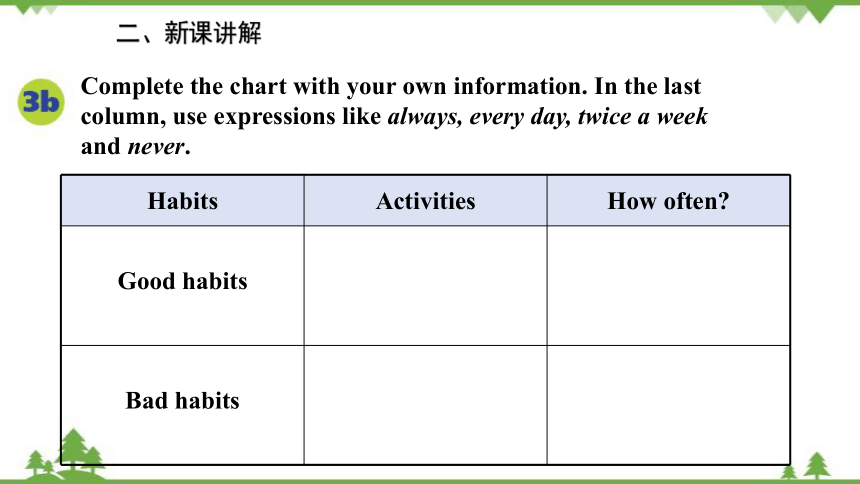
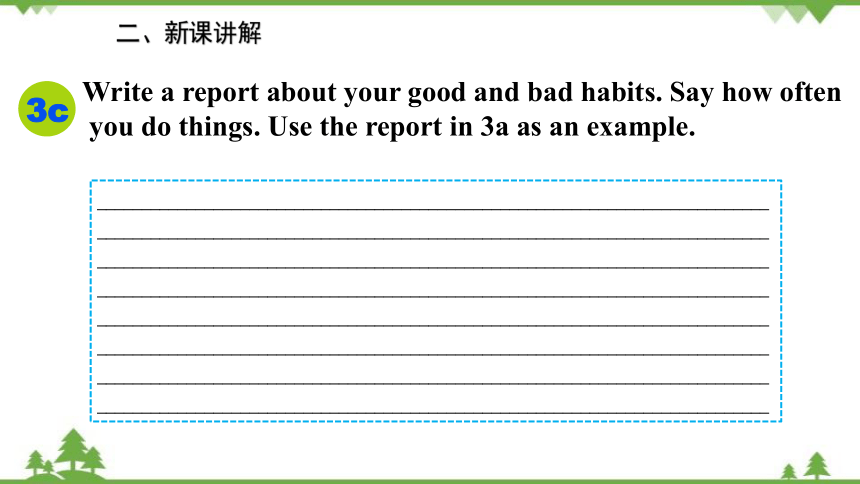
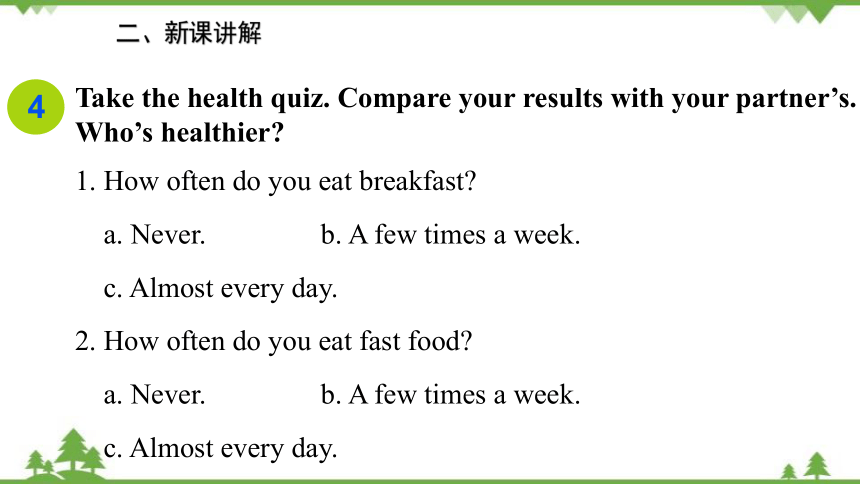
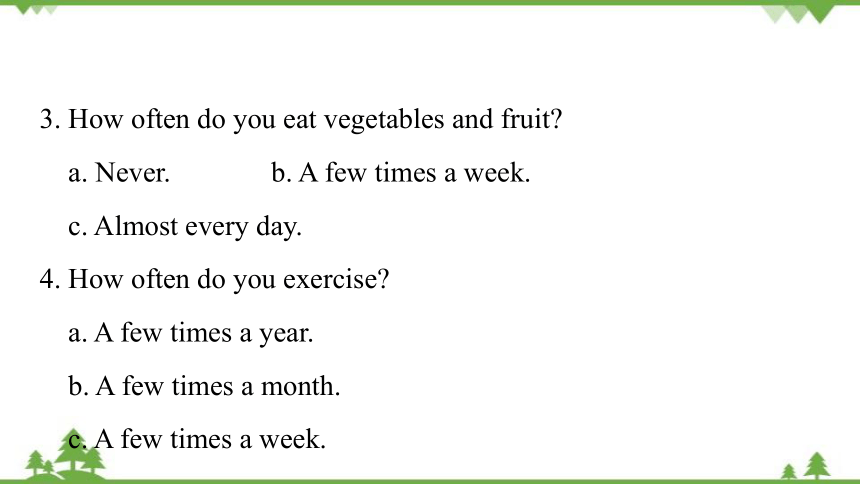
文档简介
(共19张PPT)
Unit 2
八年级英语RJ版·上册
Section B (3a-Self Check)
一、新课引入
Discussion
Do you have any habits
Are these habits good or bad for your health
二、新课讲解
Look at the information in the chart and complete the report.
Jane is a 16-year-old high school student in the United States. American Teenager magazine asked her about her habits. Jane has a lot of good habits. She ________ exercises and she reads books __________. Also, she ________ drinks juice and she ____________ stays up late. However, she has some bad habits, too. She _________ watches TV for more than two hours a day, and she ___________ eats hamburgers. Her parents are not very happy because she _____________ helps with housework and she _________ goes to the dentist for teeth cleaning. She says she is afraid!
always
every day
often
hardly ever
usually
sometimes
hardly ever
never
二、新课讲解
Complete the chart with your own information. In the last
column, use expressions like always, every day, twice a week
and never.
Habits Activities How often
Good habits
Bad habits
二、新课讲解
3c
Write a report about your good and bad habits. Say how often
you do things. Use the report in 3a as an example.
___________________________________________________________________________
___________________________________________________________________________
___________________________________________________________________________
___________________________________________________________________________
____________________________________________________________________________________________________________________________________________________________________________________________________________________________________________________________________________________________________________
二、新课讲解
4
Take the health pare your results with your partner’s.
Who’s healthier
1. How often do you eat breakfast
a. Never. b. A few times a week.
c. Almost every day.
2. How often do you eat fast food
a. Never. b. A few times a week.
c. Almost every day.
3. How often do you eat vegetables and fruit
a. Never. b. A few times a week.
c. Almost every day.
4. How often do you exercise
a. A few times a year.
b. A few times a month.
c. A few times a week.
5. How many hours do you watch TV every week
a. None. b. One to four. c. Five or more.
6. How many hours do you usually sleep at night
a. Less than six. b. Six to seven.
c. Eight or more.
二、新课讲解
1.Complete the chart with activities you do and don’t do.
What about your mother / father
always usually often sometimes hardly ever never
I
My mother or father
2. Write five sentences using the information above.
二、新课讲解
3. Fill in the blanks in the conversation.
A: What do Tom and Mike _______ do on weekends
B: They sometimes go to the museum.
A: ____________ do they go to the shopping center
B: ___________ ever. Maybe about twice a month.
A: ____________ do they watch TV
B: Mike never watches TV, but Tom watches TV ________ day.
A: Oh, I’m just like Tom. I ________ watch TV, too.
usually
How often
Hardly
How often
every
always
二、新课讲解
Lauguage points
1. 16-year-old 复合形容词,意为“十六岁的”。
He is an eighteen-year-old boy. 他是一个18岁的男孩。
2. however 副词,意为“然而,不过”。
He lives a hard life. However, he feels happy.
他生活得很艰难,然而他觉得很幸福。
辨析:however 副词,不能直接连接两个分句,必须用逗号隔开,
表示补充。
but 连词,直接引出分句,后边一般不用逗号,表示转折。
二、新课讲解
3. more than 意为“多于”。后常加表示数量的词。
There are more than 1000 students in our school.
我们学校有一千多个学生。
4. almost 副词,意为“几乎,差不多”。
用在实义动词前,系动词、助动词、情态动词后。
I almost forgot to watch the football game.
我几乎忘了看这场足球赛。
Lauguage points
二、新课讲解
Lauguage points
5. none 不定代词,意为“没有一个,毫无”。既可以指人,也可以指物。
None of us like the music.
我们中没有人喜欢这个音乐。
None of the money on the table is mine。
桌子上的钱没有一分是我的。
6. less than 意为“少于”。
The young man is less than 20 years old. 这个年轻人不到20岁。
二、新课讲解
Lauguage points
7. point 可数名词,意为“得分,点”。
作动词时,意为“指向”。常和介词at/to连用,表示指的对象或方向。
Don’t point at someone when you get angry.
当你生气的时候不要指别人。
He pointed to the high mountain far away.
他指向远处的那座高山。
三、归纳小结
________ lifestyle
Good habits
Bad habits
Activities
How often
Activities
How often
四、强化训练
改写句子。
1. My father always watches TV in the evening. (改为否定句)
My father ______ _______ _____ in the evening.
2. Mr. Zhang often comes late to the meeting. (改为同义句)
Mr. Zhang is _____ _____ _____ the meeting.
3. The twins never go to the Internet bar. (对划线部分提问)
______ _______ ____ the twins go to the Internet bar
4. We have art lessons twice a week. (对划线部分提问)
_____ _____ do you have art lessons
never watches TV
often late for
How often do
How often
四、强化训练
用所给单词的适当形式填空。
My family has a ___________ (health) lifestyle.
2. Tina’s _______ (eat) habits are pretty good.
3. Try not __________ (play) with those bad boys.
4. There are many ____________ (different) between the two girls.
5. My mother doesn’t want me ______ (be) on the school basketball team.
healthy
eating
to play
differences
to be
四、强化训练
完成句子。
1.房间里几乎没有东西。
There is ________ nothing in the room.
2.—桌子上有多少笔? —一支都没有。
—How many pens are on the desk — _______.
3.这本书花了不到20元。
The book cost _______ _______ 20 yuan.
almost
None
less than
五、布置作业
1. Write an article about your habits.
2. Preview the new words and expressions about Unit 3.
Unit 2
八年级英语RJ版·上册
Section B (3a-Self Check)
一、新课引入
Discussion
Do you have any habits
Are these habits good or bad for your health
二、新课讲解
Look at the information in the chart and complete the report.
Jane is a 16-year-old high school student in the United States. American Teenager magazine asked her about her habits. Jane has a lot of good habits. She ________ exercises and she reads books __________. Also, she ________ drinks juice and she ____________ stays up late. However, she has some bad habits, too. She _________ watches TV for more than two hours a day, and she ___________ eats hamburgers. Her parents are not very happy because she _____________ helps with housework and she _________ goes to the dentist for teeth cleaning. She says she is afraid!
always
every day
often
hardly ever
usually
sometimes
hardly ever
never
二、新课讲解
Complete the chart with your own information. In the last
column, use expressions like always, every day, twice a week
and never.
Habits Activities How often
Good habits
Bad habits
二、新课讲解
3c
Write a report about your good and bad habits. Say how often
you do things. Use the report in 3a as an example.
___________________________________________________________________________
___________________________________________________________________________
___________________________________________________________________________
___________________________________________________________________________
____________________________________________________________________________________________________________________________________________________________________________________________________________________________________________________________________________________________________________
二、新课讲解
4
Take the health pare your results with your partner’s.
Who’s healthier
1. How often do you eat breakfast
a. Never. b. A few times a week.
c. Almost every day.
2. How often do you eat fast food
a. Never. b. A few times a week.
c. Almost every day.
3. How often do you eat vegetables and fruit
a. Never. b. A few times a week.
c. Almost every day.
4. How often do you exercise
a. A few times a year.
b. A few times a month.
c. A few times a week.
5. How many hours do you watch TV every week
a. None. b. One to four. c. Five or more.
6. How many hours do you usually sleep at night
a. Less than six. b. Six to seven.
c. Eight or more.
二、新课讲解
1.Complete the chart with activities you do and don’t do.
What about your mother / father
always usually often sometimes hardly ever never
I
My mother or father
2. Write five sentences using the information above.
二、新课讲解
3. Fill in the blanks in the conversation.
A: What do Tom and Mike _______ do on weekends
B: They sometimes go to the museum.
A: ____________ do they go to the shopping center
B: ___________ ever. Maybe about twice a month.
A: ____________ do they watch TV
B: Mike never watches TV, but Tom watches TV ________ day.
A: Oh, I’m just like Tom. I ________ watch TV, too.
usually
How often
Hardly
How often
every
always
二、新课讲解
Lauguage points
1. 16-year-old 复合形容词,意为“十六岁的”。
He is an eighteen-year-old boy. 他是一个18岁的男孩。
2. however 副词,意为“然而,不过”。
He lives a hard life. However, he feels happy.
他生活得很艰难,然而他觉得很幸福。
辨析:however 副词,不能直接连接两个分句,必须用逗号隔开,
表示补充。
but 连词,直接引出分句,后边一般不用逗号,表示转折。
二、新课讲解
3. more than 意为“多于”。后常加表示数量的词。
There are more than 1000 students in our school.
我们学校有一千多个学生。
4. almost 副词,意为“几乎,差不多”。
用在实义动词前,系动词、助动词、情态动词后。
I almost forgot to watch the football game.
我几乎忘了看这场足球赛。
Lauguage points
二、新课讲解
Lauguage points
5. none 不定代词,意为“没有一个,毫无”。既可以指人,也可以指物。
None of us like the music.
我们中没有人喜欢这个音乐。
None of the money on the table is mine。
桌子上的钱没有一分是我的。
6. less than 意为“少于”。
The young man is less than 20 years old. 这个年轻人不到20岁。
二、新课讲解
Lauguage points
7. point 可数名词,意为“得分,点”。
作动词时,意为“指向”。常和介词at/to连用,表示指的对象或方向。
Don’t point at someone when you get angry.
当你生气的时候不要指别人。
He pointed to the high mountain far away.
他指向远处的那座高山。
三、归纳小结
________ lifestyle
Good habits
Bad habits
Activities
How often
Activities
How often
四、强化训练
改写句子。
1. My father always watches TV in the evening. (改为否定句)
My father ______ _______ _____ in the evening.
2. Mr. Zhang often comes late to the meeting. (改为同义句)
Mr. Zhang is _____ _____ _____ the meeting.
3. The twins never go to the Internet bar. (对划线部分提问)
______ _______ ____ the twins go to the Internet bar
4. We have art lessons twice a week. (对划线部分提问)
_____ _____ do you have art lessons
never watches TV
often late for
How often do
How often
四、强化训练
用所给单词的适当形式填空。
My family has a ___________ (health) lifestyle.
2. Tina’s _______ (eat) habits are pretty good.
3. Try not __________ (play) with those bad boys.
4. There are many ____________ (different) between the two girls.
5. My mother doesn’t want me ______ (be) on the school basketball team.
healthy
eating
to play
differences
to be
四、强化训练
完成句子。
1.房间里几乎没有东西。
There is ________ nothing in the room.
2.—桌子上有多少笔? —一支都没有。
—How many pens are on the desk — _______.
3.这本书花了不到20元。
The book cost _______ _______ 20 yuan.
almost
None
less than
五、布置作业
1. Write an article about your habits.
2. Preview the new words and expressions about Unit 3.
同课章节目录
- Unit 1 Where did you go on vacation?
- Section A
- Section B
- Unit 2 How often do you exercise?
- Section A
- Section B
- Unit 3 I'm more outgoing than my sister.
- Section A
- Section B
- Unit 4 What's the best movie theater?
- Section A
- Section B
- Unit 5 Do you want to watch a game show?
- Section A
- Section B
- Unit 6 I'm going to study computer science.
- Section A
- Section B
- Unit 7 Will people have robots?
- Section A
- Section B
- Unit 8 How do you make a banana milk shake?
- Section A
- Section B
- Unit 9 Can you come to my party?
- Section A
- Section B
- Unit 10 If you go to the party, you'll have a grea
- Section A
- Section B
